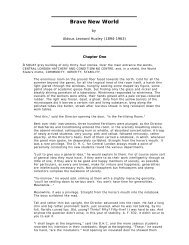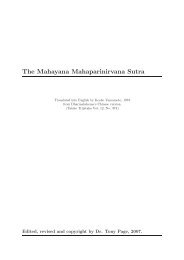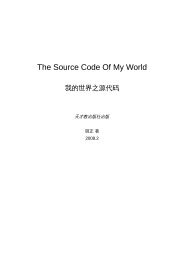Aphoristic Writings, Notebook, and Letters to a Friend, by Otto ...
Aphoristic Writings, Notebook, and Letters to a Friend, by Otto ...
Aphoristic Writings, Notebook, and Letters to a Friend, by Otto ...
You also want an ePaper? Increase the reach of your titles
YUMPU automatically turns print PDFs into web optimized ePapers that Google loves.
the meaning of my life st<strong>and</strong>s <strong>and</strong> falls with whether I can enter in<strong>to</strong> a positive relation<br />
<strong>to</strong> Good or not.<br />
If all mental life is only appearance, then I cannot in any way be worthy of an<br />
eternal life. The idea contributed <strong>by</strong> Kant of “Progressus” (<strong>to</strong>wards holiness), is thus<br />
thwarted.<br />
The transcendental is the minimum of the eternal.<br />
The genius does not need the transcendental method, because he has enough<br />
certainty in his normal intuition.<br />
The justification of the psychical method lies in the seeing of things in God! The<br />
nearer intuition comes <strong>to</strong> idea, the more the transcendental method becomes<br />
unnecessary.<br />
Here are the most important mistakes of Kant:<br />
1. The neglect of the meaning of time;<br />
2. That he makes no distinction between the reality of the inner <strong>and</strong> outer life;<br />
3. On a theoretical level, he wanted <strong>to</strong> know nothing of those things possessing a<br />
higher reality.<br />
Because crime <strong>and</strong> punishment are not actually different, one may be at ease over<br />
it : no criminal truly escapes unpunished.<br />
Critique of Kantian ethics <strong>and</strong> its “atheism”.<br />
What I claim is: that the will is always good <strong>and</strong> that there cannot be any will <strong>to</strong><br />
evil or evil will at all.<br />
Evil is renouncement of will <strong>and</strong> the birth of instinct out of want. This is even<br />
proven precisely <strong>by</strong> that the will is always conscious, <strong>and</strong> instinct unconscious.<br />
The ideas of freedom <strong>and</strong> universality must be identical. For every limitation is a<br />
determination from outside, <strong>and</strong> therefore has unfreedom. But if man is free, so must<br />
he be able <strong>to</strong> become what he wills. But the condition of that is the freedom of<br />
*<br />
*<br />
*<br />
45







